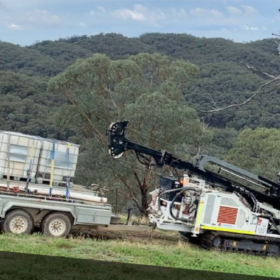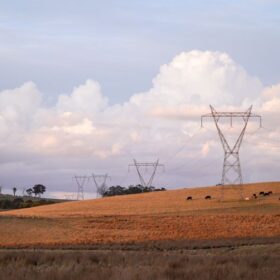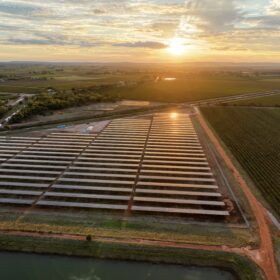Masdar (Abu Dhabi Future Energy Company), Khalifa University of Science and Technology, and the Australian government announced that they will collaborate on sea ice research and energy efficiency in Antarctica to enhance scientific understanding of the effects of global warming and climate change on the polar continent. The announcement was made during Abu Dhabi Sustainability Week, one of the world’s largest sustainability gatherings.
In the presence of HE Dr Thani Ahmed Al Zeyoudi, UAE Minister of Climate Change and Environment, the collaboration was formally agreed, through the signing of a letter of intent, by Mohamed Jameel Al Ramahi, Chief Executive Officer of Masdar, Arthur Spyrou, Australian Ambassador to the UAE on behalf of the Australian Antarctic Division of the Department of the Environment and Energy (ADD); and Dr Arif Sultan Al Hammadi, Interim Executive Vice-President, Khalifa University of Science and Technology
The collaboration will begin in February when a team will travel to Earth’s southernmost continent to monitor energy efficiency and investigate opportunities to use renewable energy at Australia’s Antarctic research stations.
“The UAE and Australia share strong ties and a deep commitment to research and clean technology,” said Mohamed Jameel Al Ramahi, Chief Executive Officer of Masdar. “We look forward to strengthening the scientific collaboration between our two countries through this fascinating Antarctic collaboration, an experience of a lifetime for its participants.”
“This partnership is further evidence of the far-reaching benefits of clean technology, in the hottest regions of the world as well as its coldest,” Al Ramahi added.
Dr Arif Sultan Al Hammadi, Interim Executive Vice President, Khalifa University of Science and Technology, said: “As the UAE’s leading research-intensive educational institution that seeks to produce world leaders and critical thinkers in applied science and engineering, we are delighted to enter into this collaboration with Australian Antarctic Division and Masdar on Antarctic sea ice research. Such cross-border collaborations reflect the strength of the UAE as a country for expertise in niche technology areas such as clean energy and earth observation. We believe this letter of intent on exchange of scientists and students in the form of sabbaticals, research missions, visiting scholar programmes or other forms of knowledge exchange, will prove beneficial to all member partners.”
The sea ice research component of the agreement, which will be led by Dr Marouane Temimi, Associate Professor of Chemical and Environmental Engineering, Khalifa University of Science and Technology, aims to leverage the latest advances in remote sensing, data assimilation and forecasting to better understand the effects of climate change on the characteristics and behaviour of Antarctic sea ice.
Dr Temimi has more than more than 50 publications in peer-reviewed journals to his credit. His recent research projects include contributing to the development of accurate and more valuable information on weather and water processes through the use of remote sensing and geographic information systems (GIS); helping to improve weather decision and the forecast of extreme events; developing web interfaces for easy and prompt access to information on weather hazard and extreme events; and using ground-based observation to improve modeling practices and satellite products in the fields of water and weather.
A team from Masdar will travel to Australia’s Casey Research Station to evaluate energy efficiency opportunities and the use of renewable energy at Australia’s three, year-round Antarctic research stations, as well as report on the environmental impacts and best practices.
“Abu Dhabi Sustainability Week 2018 is the ideal platform to celebrate and strengthen the close academic ties between Australia and the UAE,” said Dr Nick Gales, Director of the Australian Antarctic Division, part of the Australian Government’s Department of the Environment and Energy. “The pristine but hostile environment of Antarctica holds the key to forecasting changes in global climate and weather that impact all countries.”
The world’s coldest continent, Antarctica is a land mass covered with ice sheets up to four kilometres thick believed to contain up to 70 per cent of the world’s fresh water.
The Antarctic region is one of the world’s most sensitive ecosystems having a critical impact on the global climate. Antarctica has experienced air temperature increases five times the mean rate of global warming, causing significant changes to the physical environment and living ecosystems of this fragile continent.
Since 2006, Masdar has been driving clean-tech innovation. Through partnerships with Khalifa University of Science and Technology, The Catalyst and The Graphene Engineering Innovation Centre (GEIC) amongst others, Masdar has responded to some of the most pressing energy and sustainability issues by developing commercially viable technology.
With innovative collaborative projects that include a testing and R&D hub for solar and solar thermal projects, an integrated seawater energy and agriculture system for research, and water desalination pilot programme, Masdar has demonstrated its continued commitment to pioneering the future of clean tech.






By submitting this form you agree to pv magazine using your data for the purposes of publishing your comment.
Your personal data will only be disclosed or otherwise transmitted to third parties for the purposes of spam filtering or if this is necessary for technical maintenance of the website. Any other transfer to third parties will not take place unless this is justified on the basis of applicable data protection regulations or if pv magazine is legally obliged to do so.
You may revoke this consent at any time with effect for the future, in which case your personal data will be deleted immediately. Otherwise, your data will be deleted if pv magazine has processed your request or the purpose of data storage is fulfilled.
Further information on data privacy can be found in our Data Protection Policy.